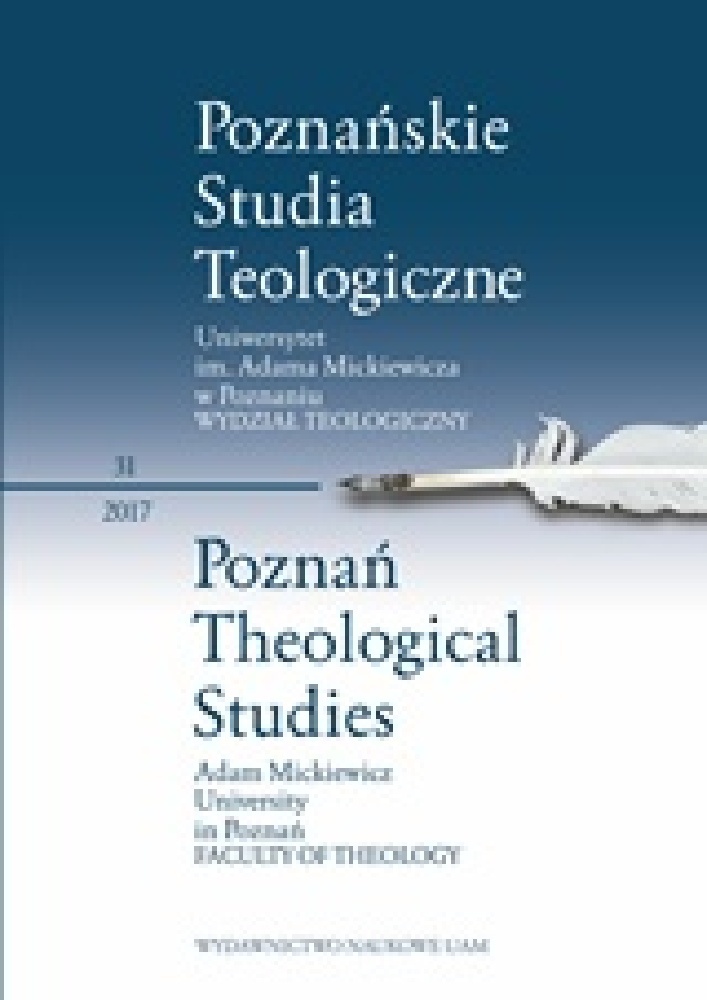Abstrakt
The aim of this paper is to propose a new distinctive view, different from the traditional one, of the person and work of the Holy Spirit, or speaking more precisely, how St. Paul and the author of the Hebrews understand the gift of the Holy Spirit in Christian life. According to their pneumatology the presence of the Holy Spirit in a baptized person marks the beginning or the first part of salvation that will be completed in the age to come. To spell out their approach they both use the language of metaphors. The first metaphor arrabōn derives from commercial life (2 Cor 1:22; 5:5; Eph 1:14). It stands for the “downpayment” or “earnest” which in trade language means the part of the whole sum of money resulting from the sale-purchase contract, the first installment and the guarantee that the deal will be kept and the total amount of money paid.
When Paul calls the Holy Spirit “the first installment”, he means He is like a down payment and a foretaste of eternal happiness and future heritage prepared for the saved. In other words the Spirit is a pledge and a guarantee: what now is paid partially, will be paid completely in eternal life. The second metaphor aparchē (Rom 8:23) originates from the agricultural life. The term “first fruits” pertains to the first grain from the field or to first fruits from the orchard. The Israelites were obliged to offer them to Yahweh. When offering Him a small part of the first produce, they actually gave Him the whole crop. In St. Paul’s view the Holy Spirit is like the first sheaf of grain offered to the Christians, and points out to the future complete harvest of salvation in heaven.
The third metaphor of the Holy Spirit – a forerunner of future fullness – is taken from the domestic life. The Spirit is considered by the author of the Hebrews as food which is tasted by the baptized (geuomai; Heb 6:4). In fact, tasting is not yet the exact eating, but consuming a small amount of a dish in order to know what it is like. Christians filled with the Holy Spirit just sample “the powers of the age to come” (Heb 6:5), because He is a foretaste of the eternal banquet in heaven.
The three studied metaphors introduce an unexpected perspective of the Holy Spirit. In earthly life He is the first installment or an advance payment of big riches provided for the believers; He is the first fruits indicating the heavenly harvest and the foretaste of an eternal banquet with God. He is also a pledge and a guarantee that what was promised by God to His people, will be granted.
Bibliografia
Dąbek T., Obdarzeni zadatkiem Ducha (2 Kor 1,22; 5,5; Ef 1,14), „Via Consecrata” 10 (2007) 7-8, 19-22.
Dąbek T., Posiadający pierwsze dary Ducha (Rz 8,23), „Via Consecrata” 10 (2007) 9, 43-46.
Gieniusz A., Ten aparchen tou pneumatos echontes - sens i funkcja metafory w Rz 8,23-25, w: Pan moim światłem. Księga pamiątkowa dla Księdza Profesora Jerzego Chmiela w 65. rocznicę urodzin, red. W. Chrostowski, Warszawa 2000, 159-178.
Jankowski A., Duch Dokonawca. Nowy Testament o posłannictwie eschatologicznym Ducha Świętego, Kraków 2003.
Jankowski A., Sens trzech przenośni Pawłowych: „pierwsze dary” – „zadatek” – „pieczętowanie” (Rz 8,23; 2 Kor 1,22; 5,5; Ef 1,13n; 4,30), „Śląskie Studia Historyczno-Teologiczne” 4 (1971), s. 23-37.
Jelonek T., Rola Ducha Świętego według Listu do Hebrajczyków, „Ruch Biblijny i Liturgiczny” 34 (1981) 2, s. 119-121.
Kasiłowski P., Duch Święty w Liście do Hebrajczyków, „Bobolanum” 11 (2000) 2, 417-445.
Misztal W., Zadatek Ducha Świętego. Pawłowe rozumienie Ducha i możliwości stojących przed chrześcijaninem, „Polonia Sacra” 8 (2004) 14, 203-225.
Rakoczy T., Rzeczywistość eschatyczna w Liście do Hebrajczyków, „Analecta Cracoviensia” 1 (1969), s. 150-176.
Wichary M., Zaczątek Ducha, „Słowo Prawdy” 91 (2016) 5, 12-14.
Licencja
Copyright
© 2017 Uniwersytet im. Adama Mickiewicza w Poznaniu, Wydawnictwo Naukowe UAM, Poznań
OPEN ACCESS
